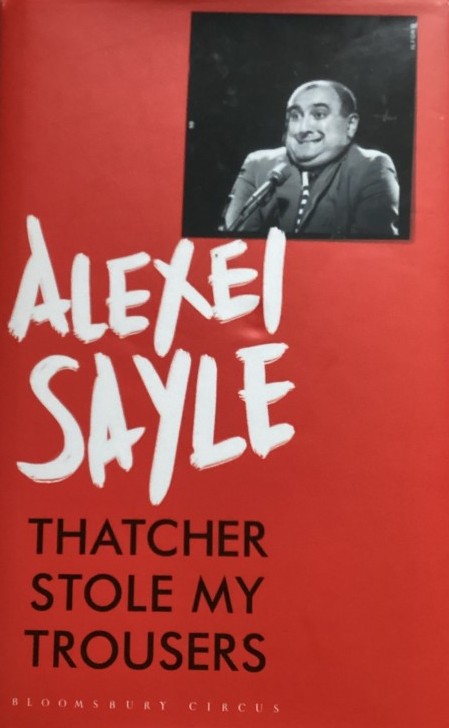Inspiring Older Readers
 posted on 01 Dec 2024
posted on 01 Dec 2024
Thatcher Stole My Trousers by Alexi Sayle
There’s plenty to choose from when it comes to naming things that are emblematic of the dismal state of popular culture in the first half of the 1970s but you’d have to try especially hard to top the comedians that saturated the variety television shows of that period. Almost universally men, these comics relied on an undiluted diet of sexism, racism and pretty much any other discriminatory ‘ism’ they could conjure-up. To watch them was to feel your brain dying by increments.
There had to be a sweeping out of the stables at some point and I’m pretty sure it was the spirit of punk that swept through music in the mid-late 70s that created the audience for what became known as ‘alternative’ comedy – a more politically conscious, harder kind of observation that rejected the discriminatory and sanctioned the experimental. Alexi Sayle found himself on the frontline of this new cultural wave and I always enjoyed his chaotic, aggressive, confrontational brand of humour: dressed in a suit two sizes too small, a pork-pie hat and a stripy slim-jim tie, he presented as if he’s was about to burst off stage and attack his audience.
In the years since these ‘alternative’ comics first appeared, they themselves have become the new ‘establishment’ and the confrontational Sayle has mellowed into someone it’s now safe to have on BBC Radio 4 – his past persona is still just about edgy enough to suggest that he’s non-conformist without actually scaring the horses.
And Sayle has also established himself as an author – writing perfectly competent novels and autobiography, of which Thatcher Stole My Trousers is the second instalment that deals with his journey from art school student to television personality.
I should say at this point that I think Trousers is in tone and temperament two different books welded together in one jacket. The first half, which I enjoyed tremendously, deals with his decision to leave Liverpool and head to Chelsea Art School – despite the fact that he seems to be convinced he had little aptitude for art or for doing anything that might approach hard work (or work of any kind, in point of fact).
This first half is a riotous journey through his rather confused entanglement with radical left-wing politics (he was, the first part of autobiography Lenin Ate My Homework tells us, the child of Communist inclined parents) and his various slum-like flats while finding time to get married and have a dalliance with film-making. Sayle has the ability to write in a style that closely echoes his voice which, if you know it, will be constantly in your head.
It’s almost impossible to read the first half of the book without laughing out aloud and perversely enjoying the sight of Sayle stumbling through the most unlikely career opportunities – including becoming a part-time FE lecturer and wannabe comedian.
But, of course without knowing it, he’s on the path to an unlikely breakthrough and the second half of the book deals with the rise of the Comedy Store and with it Sayle’s elevation. And it’s at this point the whole tone of the book changes – and not, for my money, for the better. What we now get is the (to some degree inevitable) name-dropping and the whole show-biz thing. I really didn’t need to hear about his unlikely friendship with Sting and the details of his time of Chris Tarrant’s OTT (the adult iteration of Tiswas) really doesn’t do it for me. Television personality memoirs I can live without and somehow it completely edges out the wider social insights of the first half of the book.
I think this could have been a really enjoyable read if it had stopped at the moment the Comedy Store comes onto the scene – put that in another book for those who want it – but by slamming the two parts together as a single story the back of the book is broken.
But, of course, you may disagree with me. You’ll only know if you try it for yourself. Second hand copies are easily and cheaply available.
Terry Potter
December 2024